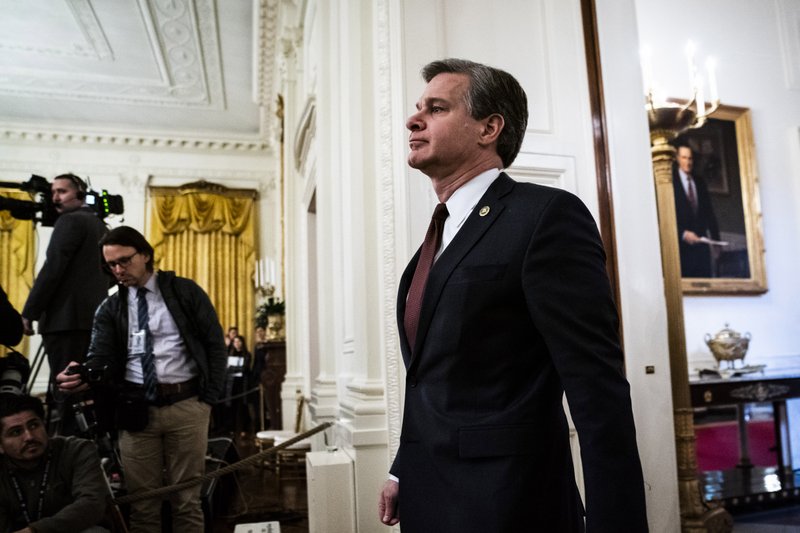The Justice Department inspector general revealed Tuesday that he found errors in every FBI application to a secret surveillance court his office examined as part of an ongoing review -- suggesting the problems exposed in the bureau's probe of President Donald Trump's 2016 campaign extend far beyond that case alone.
The memorandum issued by Inspector General Michael Horowitz stems from an audit launched last year after his office found 17 serious problems with the FBI's surveillance applications targeting former Trump campaign adviser Carter Page.
The interim results of that audit suggest that the problems that plagued the Page investigation may exist in other counterterrorism and counterintelligence cases. The memorandum may buttress some of the criticism that Trump and his supporters have leveled at the FBI.
Stephen Vladeck, a law professor at the University of Texas, Austin, said the memorandum shows the problem is not isolated to a single case but that "the entire process is prone to abuse" -- a function of inadequate accountability and oversight.
"The irony here is that, in one sense, the memorandum suggests that the Carter Page episode was not a partisan political scandal," Vladeck said. "The irony is it suggests it was part of a far bigger and more problematic pattern -- a nonpartisan, systemic problem."
He said what the report "should hopefully put to rest is the assertion we hear across different administrations that we can trust the Justice Department to check itself."
A key part of the ongoing inspector general review has been analyzing the Woods files -- documents created to ensure the accuracy of the FBI's applications to the court created by the Foreign Intelligence Surveillance Act, commonly referred to as FISA.
The inspector general selected a sample of 29 FISA applications to review -- and found problems with all of them. In 25 applications, Horowitz's team found "apparent errors or inadequately supported facts," while in four of the cases, they were unable to find any Woods file at all. In three of those missing supporting documentation, it's unclear if a Woods file was ever created.
The inspector general's staff continues to review the surveillance applications, but the memo bluntly states, "we do not have confidence that the FBI has executed its Woods Procedures in compliance with FBI policy, or that the process is working as it was intended to help achieve the 'scrupulously accurate' standard for FISA applications."
The inspector general's office did not make a judgment as to whether the mistakes it identified were "material" to the investigation or to the court's decision to authorize the wiretaps.
He did, however, make two immediate recommendations -- that the FBI conduct a survey to determine if any more Woods files are missing, and to take a closer look at the results of past accuracy reviews by the Justice Department that should have shown these problems earlier and find ways to fix them.
In a response letter, FBI Associate Deputy Director Paul Abbate said the FBI agreed with the office's recommendations, and that the errors identified by the inspector general will be addressed by the more than 40 corrective actions that FBI Director Christopher Wray ordered last year after the Russia probe report.
"As Director Wray has stressed, FISA is an indispensable tool to guard against national security threats, but we must ensure that these authorities are carefully exercised and that FISA applications are scrupulously accurate," Abbate wrote.
A Justice Department spokeswoman said officials are "committed to putting the Inspector General's recommendations into practice and to implementing reforms that will ensure that all FISA applications are complete and accurate."
Civil-rights groups said the memorandum vindicates their long-held view that the FISA process is prone to abuse precisely because of the intense secrecy that surrounds it.
"The Carter Page issue isn't a one-off," said Neema Singh Guliani, senior legislative counsel for the American Civil Liberties Union. "It's becoming more and more clear that procedural surface changes are not going to address the fundamental flaws with the FISA process."
"No one was more appalled than the Attorney General at the way the FISA process was abused. This abuse resulted in one of the greatest political travesties in American history and should never happen again," Justice Department spokeswoman Kerri Kupec said in a statement.
"However," she added, "FISA remains a critical tool to ensuring the safety and security of the American people, particularly when it comes to fighting terrorism."
Republican Sen. Lindsey Graham, the chairman of the Senate Judiciary Committee, said he would ask Horowitz to appear before the panel to explain his findings.
Information for this article was contributed by Devlin Barrett and Ellen Nakashima of The Washington Post; and by Eric Tucker of The Associated Press.
A Section on 04/01/2020

